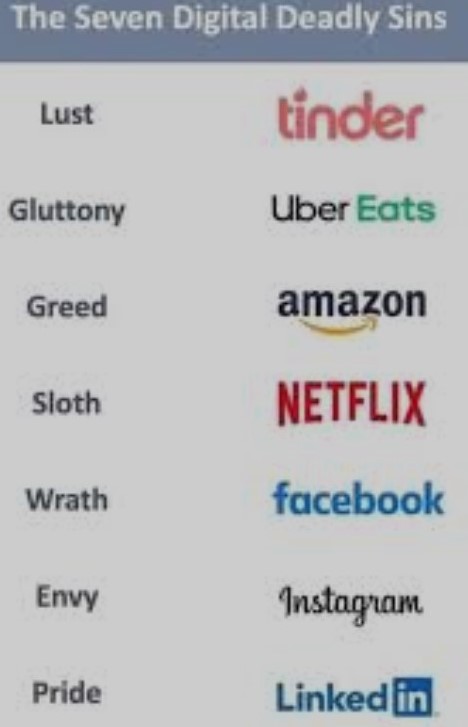The cover photo of this article has been shared on various social media platforms for some time. Even if one or the other association between a mortal sin and a corresponding online or social media platform seems too exaggerated, there is still a lot of truth in this picture.
We introduced the topic with a short „impulse contribution“ on the subject of digitization before getting to the survey where users could then compare their responses with the opinion of others.
1) Impulse Contribution
Of course the title picture is not insinuating that using the online platforms mentioned would correspond to a mortal sin in its actual sense[1], but that there is a very clear indication of the possible effects of using these platforms on our mental balance. Sloth, gluttony, envy, anger, greed, lust and pride are all psychological imbalances that can harm us in one way or another if they become part of our daily thinking or even acting. But why is it that online portals and platforms in particular can so easily have such sustainably negative impacts on our psyche and cause it to become imbalanced?
Social Comparison
One reason is our tendency to compare oneself “socially” with others. On platforms like Instagram, Facebook, LinkedIn, etc. it is impossible not to compare yourself to others. It’s part of the „genetics“ of these platforms. But if you are constantly reminded of what great pictures others are posting – from their vacation in Barbados, about their perfect body, about their amazing new job they are about to start, about their cool parachute jump, etc. that can trigger envy and/or self-doubt or even lead to a distorted self-perception (in which one feels inferior, since you’re obviously not as „great“). What is overlooked is that what is presented and disclosed on these platforms is strongly filtered and all too often does not match reality at all. Everyone shows themselves there in the best light , according to their frame of thought, often exaggerating, or even outright lying.
Sensory Overload
One cannot expand one’s receptivity indefinitely. The brain needs rest periods. If I’m constantly stuck in online video channels that play clip after clip, I can no longer switch off to recover. One audiovisual YouTube stimulus follows another, one Netflix video after the other is binge-watched. You get so carried away by what you see and hear, that you start to lose touch with reality, which can have an enormous impact on your performance and also on your real social contacts. A study by the University of Vienna shows: Above all, the abundance of audiovisual stimuli provided by Internet video channels can actually overwhelm the brain.
Likes, likes, likes
With every like that we receive for our posts on Twitter, Tinder, LinkedIn, XING, Facebook, Instagram, etc., our brain releases happiness hormones. Our brain can actually get addicted to likes. Who doesn’t enjoy being „liked“? One danger here is that you are spending more and more time on social media and neglecting your analogue life, especially when there are fewer alternative sources, i.e. positive social contacts, for positive recognition.
Going down the Rabbit Hole
Test it yourself (or better not!): start „liking“ posts on Facebook which indicate certain interests and with each such like you will be offered further posts that correspond to these obvious interests. Latest since Facebook whistleblower Frances Haugen it is no longer a secret that Social media platforms use so-called algorithms that analyze exactly what you like on their platforms – because what you like interests you and what interests you makes you linger on a certain social media sites and consume similar posts. So you can easily develop a completely distorted image of reality, since you are only communicating with like-minded people – there are no other opinions on a topic of interest because those all got filtered out by an algorithm. So you can get drawn in further and further into a surreal world of conspiracy theories: the rabbit hole. It’s obvious that gullible people, children and young people are particularly affected by this danger.
2) Survey
The poll is in German, but you may find the translation of the possible answers here below. If you want to participate in the poll, please just remember the lower case character of the answer you would give and click the same in the German poll below. Afterwards you may compare your answer with the answers others have already provided.
So, now it’s your turn. What do you think is the best way to achieve healthy use of online or social media platforms for yourself?
a) I avoid dealing with online or social media platforms as much as possible. So I don’t even expose myself to the dangers
mentioned above.
b) I always make myself aware of the dangers of dealing with such online or social media platforms before I use them.
c) I am aware of the dangers of using these platforms and therefore have a certain immunity to these dangers, i.e. I don’t
need any particular method for healthy use.
d) I consciously check my usage behavior on a regular basis and adjust it if I determine in my self-analysis that I spend
too much time online or allow myself to be influenced too much by this online world.
e) I do not see the effects mentioned in the impulse article as a threat to my mental health. A special method for healthy use
is not necessary. So I use them as I please.
f) None of the answers match my opinion on any method of dealing with these platforms.
Do you not find yourself in the answers? Then write to us by email to info@ethica-rationalis.org or use our Contactform.
Authors: The Ethica Rationalis editorial team
__________________
[1] Mortal sins are actually closely related to the Catholic Church, which defines mortal sins as sins that are particularly serious and through which man gives up his relationship with God of his own, conscious will



